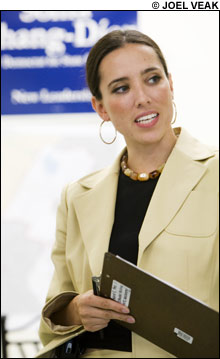
THE NEED FOR SPEED: New state senator Sonia Chang-Díaz and fellow rookie legislators will have to hit the ground running. |
At this incalculably critical time — with a fiscal nightmare threatening billions of dollars of state-government spending and momentous budget decisions to be made — everyone in Massachusetts wants to be represented on Beacon Hill by someone with clout. Someone with the connections and the power to step in and fight for his or her home district’s interests.Unfortunately, Boston and its northern suburbs will be entering this maelstrom with an unusual number of low-on-the-totem-pole newbies representing them in the State Senate.
In fact, half of the six new state senators sworn into office this week represent this area: Sonia Chang-Díaz of Jamaica Plain, Ken Donnelly of Arlington, and Jamie Eldridge of Acton. And a fourth, Jennifer Flanagan of Leominster, represents portions of MetroWest.
Add to that list of six freshmen Anthony Petruccelli of East Boston and Anthony Galluccio of Cambridge, both of whom became state senators in special elections barely a year ago. Patricia Jehlen of Somerville, first elected in a special State Senate election in 2005, is also lacking in seniority.
Just by comparison, consider that seven of the eight state senators who represent Plymouth County have been in office since at least 2000, including State Senate President Therese Murray.
Altogether, the six new faces make up the biggest freshman class in the 40-member chamber since 1993 — when Murray first took office with nine others.
New state senators have a triple-bill on their plate, says Galluccio. They need to learn the needs of their districts, put together their office staffs, and forge relationships with other state senators.
Ordinarily, freshmen lawmakers can afford to take baby steps with these tasks, all while keeping a relatively low profile. But today, with huge budget cuts under debate — not to mention other hot-button local issues, such as transportation and tolls — there is no time to get up to speed.
“For me, having had a year before the crisis hit to represent myself to other senators was important,” says Galluccio. “So now, if a budget issue comes up that is a Charlestown issue, or a Cambridge issue” — like drug prevention or after-school programs — “they know it’s one of my issues, and bring me in.”
“Would it be easier to be coming in as a new member with a billion-dollar surplus than with a billion-dollar deficit?” asks Petruccelli. “Of course it would.”
Three of the six new state senators, including Eldridge and Flanagan, at least have the advantage of coming from the State House of Representatives, where they gained experience in the workings of the State House, and formed relationships with some of their new colleagues. But State Senator Jack Hart of Boston, who moved from the House to the Senate in 2001, cautions they’ll quickly learn that, in the upper chamber, “You have more responsibility in the building — and four times the district to stay in touch with.”
The others, including Chang-Díaz and Donnelly, are absolutely new to the building. But both Galluccio and Petruccelli say that, contrary to common perception, seniority isn’t the end-all, be-all. Experience outside the State House, they say, will also be valued by State Senate leaders.